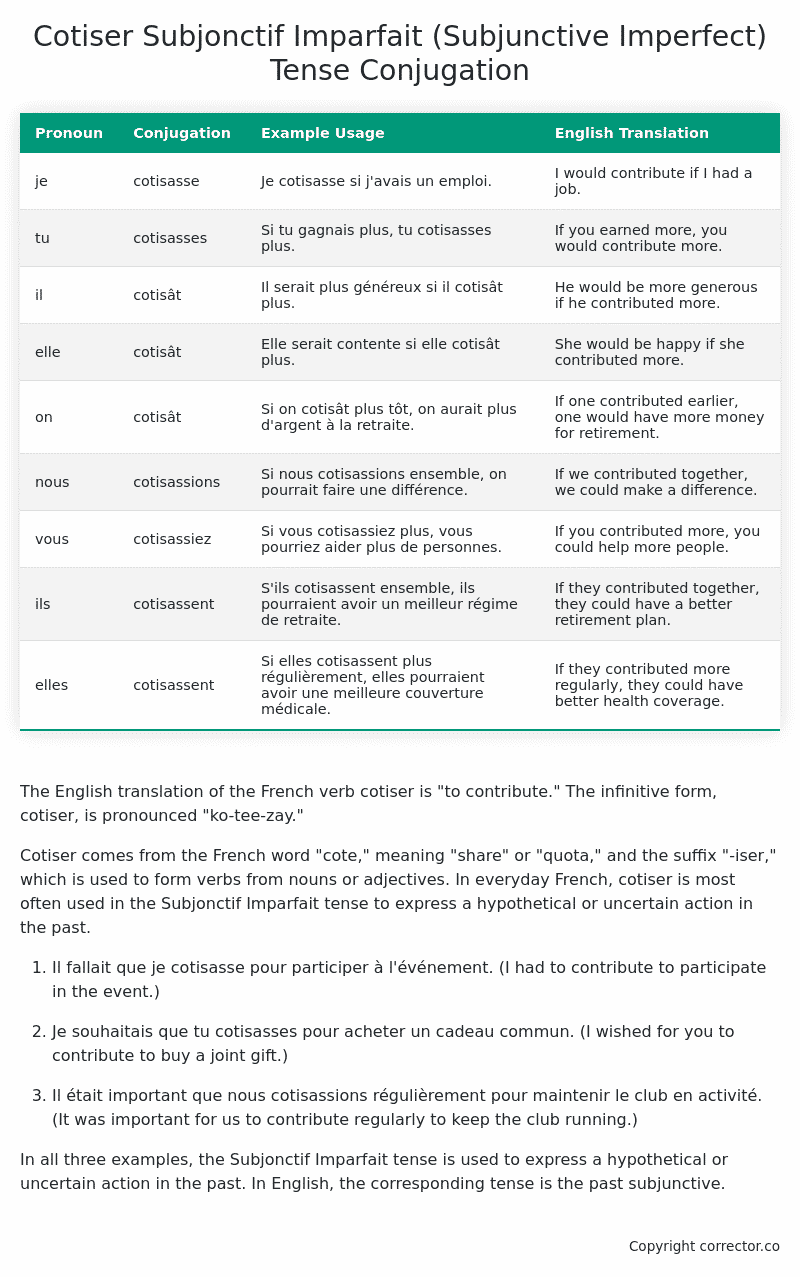Subjonctif Imparfait (Subjunctive Imperfect) Tense Conjugation of the French Verb cotiser
Introduction to the verb cotiser
The English translation of the French verb cotiser is “to contribute.” The infinitive form, cotiser, is pronounced “ko-tee-zay.”
Cotiser comes from the French word “cote,” meaning “share” or “quota,” and the suffix “-iser,” which is used to form verbs from nouns or adjectives. In everyday French, cotiser is most often used in the Subjonctif Imparfait tense to express a hypothetical or uncertain action in the past.
-
Il fallait que je cotisasse pour participer à l’événement. (I had to contribute to participate in the event.)
-
Je souhaitais que tu cotisasses pour acheter un cadeau commun. (I wished for you to contribute to buy a joint gift.)
-
Il était important que nous cotisassions régulièrement pour maintenir le club en activité. (It was important for us to contribute regularly to keep the club running.)
In all three examples, the Subjonctif Imparfait tense is used to express a hypothetical or uncertain action in the past. In English, the corresponding tense is the past subjunctive.
Table of the Subjonctif Imparfait (Subjunctive Imperfect) Tense Conjugation of cotiser
| Pronoun | Conjugation | Example Usage | English Translation |
|---|---|---|---|
| je | cotisasse | Je cotisasse si j’avais un emploi. | I would contribute if I had a job. |
| tu | cotisasses | Si tu gagnais plus, tu cotisasses plus. | If you earned more, you would contribute more. |
| il | cotisât | Il serait plus généreux si il cotisât plus. | He would be more generous if he contributed more. |
| elle | cotisât | Elle serait contente si elle cotisât plus. | She would be happy if she contributed more. |
| on | cotisât | Si on cotisât plus tôt, on aurait plus d’argent à la retraite. | If one contributed earlier, one would have more money for retirement. |
| nous | cotisassions | Si nous cotisassions ensemble, on pourrait faire une différence. | If we contributed together, we could make a difference. |
| vous | cotisassiez | Si vous cotisassiez plus, vous pourriez aider plus de personnes. | If you contributed more, you could help more people. |
| ils | cotisassent | S’ils cotisassent ensemble, ils pourraient avoir un meilleur régime de retraite. | If they contributed together, they could have a better retirement plan. |
| elles | cotisassent | Si elles cotisassent plus régulièrement, elles pourraient avoir une meilleure couverture médicale. | If they contributed more regularly, they could have better health coverage. |
Other Conjugations for Cotiser.
Le Present (Present Tense) Conjugation of the French Verb cotiser
Imparfait (Imperfect) Tense Conjugation of the French Verb cotiser
Passé Simple (Simple Past) Tense Conjugation of the French Verb cotiser
Passé Composé (Present Perfect) Tense Conjugation of the French Verb cotiser
Futur Simple (Simple Future) Tense Conjugation of the French Verb cotiser
Futur Proche (Near Future) Tense Conjugation of the French Verb cotiser
Plus-que-parfait (Pluperfect) Tense Conjugation of the French Verb cotiser
Passé Antérieur (Past Anterior) Tense Conjugation of the French Verb cotiser
Futur Antérieur (Future Anterior) Tense Conjugation of the French Verb cotiser
Subjonctif Présent (Subjunctive Present) Tense Conjugation of the French Verb cotiser
Subjonctif Passé (Subjunctive Past) Tense Conjugation of the French Verb cotiser
Subjonctif Imparfait (Subjunctive Imperfect) Tense Conjugation of the French Verb cotiser (this article)
Subjonctif Plus-que-parfait (Subjunctive Pluperfect) Tense Conjugation of the French Verb cotiser
Conditionnel Présent (Conditional Present) Tense Conjugation of the French Verb cotiser
Conditionnel Passé (Conditional Past) Tense Conjugation of the French Verb cotiser
L’impératif Présent (Imperative Present) Tense Conjugation of the French Verb cotiser
L’infinitif Présent (Infinitive Present) Tense Conjugation of the French Verb cotiser
Struggling with French verbs or the language in general? Why not use our free French Grammar Checker – no registration required!
Get a FREE Download Study Sheet of this Conjugation 🔥
Simply right click the image below, click “save image” and get your free reference for the cotiser Subjonctif Imparfait tense conjugation!

Cotiser – About the French Subjonctif Imparfait (Subjunctive Imperfect) Tense
Formation
Common Everyday Usage Patterns
Interactions with Other Tenses
Subjonctif Présent
Indicatif Passé Composé
Conditional
Conditional Perfect
Summary
I hope you enjoyed this article on the verb cotiser. Still in a learning mood? Check out another TOTALLY random French verb conjugation!


